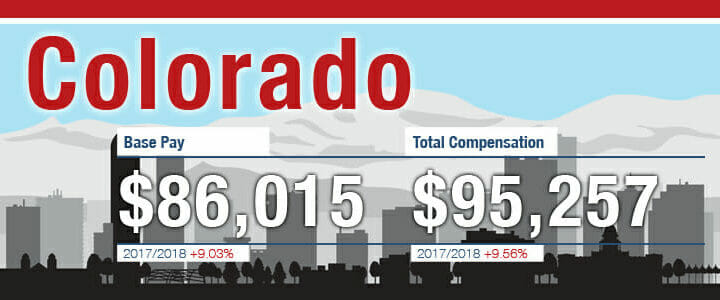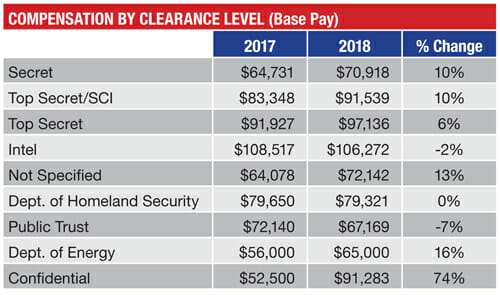With a diversified economy known for its concentration of scientific research and high-tech industries, like aerospace and cybersecurity, Colorado was ranked 20th largest economy in the United States. In fact, Colorado’s economy is growing faster than almost any other state in the nation. The state’s GDP expanded 3% in the first quarter of this year, according to data from the Bureau of Economic Analysis.
“Overall employment numbers in Colorado continue at a strong pace,” said Jeff Wasden, president of the Colorado Business Roundtable. “Labor force participation is up, total number of employed workers up, while unemployment increased one-tenth of a percentage point to 2.8,” Wasden told ClearanceJobs. “Tech, service industry, healthcare, and engineering are driving the overall health of Colorado’s economic picture. While the numbers would paint a much more competitive market that was driving up wages, wage growth has not accelerated at the same pace and continues to lag. Metro Denver (I-25 corridor) is significantly outpacing the rest of the state in postings and wages.”
High tech jobs are in demand. A recent study from the Colorado Springs Chamber & EDC reveals that cybersecurity brings a nearly $1 Billion annual benefit to the local economy. In addition, Colorado employs more than 7% of the nation’s aerospace workforce, according to a 2017 study by the Metro Denver Economic Development Corporation.
Colorado Salaries by clearance level
According to the 2018 ClearanceJobs Compensation Survey results, total compensation for all surveyed security-cleared professionals worldwide is $93,004, while total compensation in Colorado was slightly above the national average at $95,256. The mean base pay and mean total compensation increased more than 9%, also slightly above the summary mean base pay nationwide.
Top Secret/SCI level clearances increased 10% in both mean and median base pay, as did Top Secret, which increased 10% in both mean and median total compensation. Counterintelligence polygraph holders increased 13% in mean base pay and 11% in median base pay. The survey found that management and mid-career pay levels are also up.
The Sky is the Limit in Colorado
In August the Federal Aviation Administration (FAA) approved a commercial spaceport license for Front Range Airport in Adams County, six miles south of Denver International Airport. This could allow the facility to be transformed into the Colorado Air and Space Port, the first of its kind in the United States.
In 2017, the Centennial State ranked number one in the nation for private aerospace employment. The Denver-metro area now has the highest concentration of private-sector aerospace employment in the country, according to local economic development studies. While the state is also home to 130 space companies, most of them are working as contractors for NASA and the U.S. military.
According to the Aerospace Industries Association, there were 28,520 people in the aerospace and defense workforce last year, with 12,740 in direct employment and another 15,780 in the supply chain employment. The state’s share of national aerospace and defense workforce was 1.2%, and saw a 14.6 percent five-year employment growth rate (2012-2017). The average wage for an aerospace and defense employee in Colorado last year was $118,716.
The Colorado Air and Space Port could increase the numbers and salaries. While the FAA has given the green light, the next step is for the operators to apply for and receive a license for the Space Port, and then it will need a license for the vehicles. The vehicles won’t launch vertically like those at Cape Canaveral, but instead would launch horizontally or similar to an airplane.
education opportunities abound in aerospace and defense
According to the Colorado Office of Economic Development, the state continues to possess tremendous depth and scope in military, academic and technical organizations, and training opportunities. Colorado currently hosts over 470 institutions, including publicly supported (made up of research universities, four-year state colleges, community colleges and local district colleges), private accredited (which includes for-profit, non-profit, and seminary), area technical, and private occupational institutions educating approximately 400,000 students. In 2016, 23,602 students received Post 911 GI Bill benefits while attending 116 different public and private educational institutions. The students, through the institutions, received $186 million in awards.
In addition, the report noted that Colorado’s aerospace industry sector ranked second in 2016 out of 50 states in both total private-sector employment and percentage of total employment. The industry embraces widespread collaborations with out-of-state industry partners as well as in-state and out-of-state universities and colleges. The ties with University of Colorado Boulder (UCB) and Laboratory for Atmospheric and Space Physics (LASP) are exceptional. UCB just broke ground on a very expensive aerospace building.
“61% of aerospace economic growth in Colorado is directly attributed to defense dollars and many programs that involve sensitive technology and require security clearances,” said Jay Lindell, aerospace and defense industry champion at the Colorado Office of Economic Development.
“Aerospace in general in Colorado has some the highest salaries of any economic sector with the average salary more than double the state average,” Lindell told ClearanceJobs. “Defense has a $36.6 Billion economic impact in Colorado.”
The Colorado Office of Economic Development also noted that total defense sector-related employment in Colorado is 247,000 jobs – up from the 170,000 found in the 2015 study that looked only at military installations and DoD contracting. This currently makes up about 7.5% of the total state wage and salary employment, based on North American Industrial Classification System (NAICS), up from 5.2% from the 2015 study. This includes both persons employed directly by the defense sector, as well as the multiplier effect of indirect and induced jobs.
Job Security in CyberSecurity
One of the tightest job markets right now in the United States is in cybersecurity where there are simply far more openings than individuals who can fill those positions.To address the shortage, this past spring the CU Denver Business School held the Mountainwest Cybersecurity Consortium Spring Conference, which was attended by representatives from several universities and community colleges. Participating schools included Colorado State University, Western State College, New Mexico State University, Regis University, the Colorado School of Mines, and several community colleges in Colorado.The goal of the group is to determine how to best prepare graduates to enter the workforce and tackle these modern threats after graduation.
This event came two years after then-Governor John Hickenlooper announced plans to build a National Cybersecurity Center in Colorado Springs, and months later signed legislation allocating $7.93 Million to renovate the former satellite plant to house this new facility. This summer the center moved from temporary offices near the University of Colorado at Colorado Springs to the former satellite plant now owned by the school.
With just four employees, it is still smaller in scale than what Hickenlooper envisioned – and at present won’t be helping businesses, nonprofits, and government agencies recover from cyberattacks, but instead it will share space with an accelerator program designed to help cybersecurity businesses grow.
In addition UCCS has announced plans to move its cyber security degree program and contract with businesses to offer short-term specialized training programs that lead to certification for cybersecurity professionals to the center this year.
Colorado’s workforce is also benefiting from transplanted workers who are moving to the Centennial State in the hope of finding greener pastures in the Rockies.”Population numbers in CO have risen steadily, with immigration coming from California, Texas, Florida, Illinois, and Arizona primarily,” said the Colorado Business Roundtable’s Wasden.
The downside, however, is that salaries need to stay competitive to keep other workers in the state.
“While that paints a positive picture related to attracting skilled workers, the cost of living has driven others out of Colorado,” Wasden told ClearanceJobs. “Spiraling housing costs, congestion, and specificity of skills required for open jobs have impacted market and opportunities for job seekers.”
This article is one in a series based on the 2018 ClearanceJobs Compensation Survey. This survey was administered online between October 30, 2017 and February 9, 2018. Participants had to have a current, active federal security clearance and be currently employed to be included in the results, which included 20,883 usable responses.






